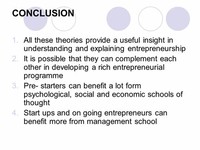Facts about Entrepreneurs

Jean-Baptiste Say also emphasized the importance of entrepreneurs, to the point of considering them as the fourth factor of production (behind land, capital, and labor).

Another early economic theory of entrepreneurship and its relationship to capitalism was proposed by Francis Amasa Walker (1888), who saw profits as the "wages" for successful entrepreneurial work.

Famous Australian entrepreneurs include Gerry Harvey (auction house turned to homewares and electronics retailer), Frank Lowy (shopping center real estate), and Dick Smith (electronics).

Entrepreneurship is the practice of starting new organizations, particularly new businesses, generally in response to identified opportunities.

Richard Cantillon was known for his demand theory of entrepreneurship in which he said production depends on the demand of land owners who contract out their work.

A more generally held theory is that entrepreneurs emerge from the population on demand, from the combination of opportunities and people well-positioned to take advantage of them.

The understanding of entrepreneurship owes a lot to the work of economist Joseph Schumpeter.

Business entrepreneurs are often highly regarded in U.S. culture as critical components of its capitalistic society.

Famous British entrepreneurs include Richard Branson (travel and media), James Dyson (home appliances), and Alan Sugar (computers).

Famous French entrepreneurs include Bernard Arnault and Francis Bouygues.

Business entrepreneurs often have strong beliefs about a market opportunity and are willing to accept a high level of personal, professional, or financial risk to pursue that opportunity.

Famous Japanese entrepreneurs include Konosuke Matsushita, Soichiro Honda, Akio Morita, Eiji Toyoda.

Casson (2003) has extended this notion to characterize entrepreneurs as decision makers who improvise solutions to problems which cannot be solved by routine alone.

Famous German entrepreneurs include Werner von Siemens and Ferdinand von Zeppelin.

Say called entrepreneurs "forecasters, project appraisers, and risk-takers."

Behaviorial scientists express this by saying that entrepreneurs perceive the "locus of control" to be within themselves.

Entrepreneurship is often a difficult undertaking, as the majority of new businesses fail.

On the supply-side, research studies have shown that entrepreneurs are convinced that they can command their own destinies.

Entrepreneurship forces "creative destruction" across markets and industries, simultaneously creating new products and business models others.

Famous Indian entrepreneurs include Vinod Khosla, Kanwal Rekhi and many more who contributed to Silicon Valley's entrepreneur revolution.

Entrepreneurship today, however, is widely regarded as an integral player in the business culture of American life, and particularly as an engine for job creation and economic growth.

Eugen von Bцhm-Bawerk suggested that entrepreneurs bring about structural changes as their efforts are guided by changes in the relative prices of capital goods.
